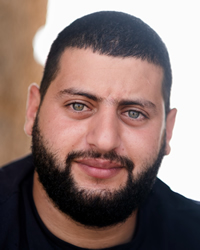Arab, Palestinian in Lebanon

Photo Source:
Levi Meir Clancy - Wikimedia
Creative Commons
|
Send Joshua Project a map of this people group.
|
| People Name: | Arab, Palestinian |
| Country: | Lebanon |
| 10/40 Window: | Yes |
| Population: | 222,000 |
| World Population: | 11,506,100 |
| Primary Language: | Arabic, Levantine |
| Primary Religion: | Islam |
| Christian Adherents: | 38.00 % |
| Evangelicals: | 0.10 % |
| Scripture: | New Testament |
| Ministry Resources: | Yes |
| Jesus Film: | Yes |
| Audio Recordings: | Yes |
| People Cluster: | Arab, Levant |
| Affinity Bloc: | Arab World |
| Progress Level: |
|
Introduction / History
On November 29, 1947, the United Nations voted to partition what remained of the British Mandate of Palestine into two states: one Jewish, and one Arab. The Palestinian Arabs rejected the proposal as well as the surrounding Arab states, it was accepted by the Jews. On May 14, 1948, the Jewish population declared its independence by declaring the establishment of the State of Israel. The armies of Egypt, Iraq, Jordan, Lebanon and Syria promptly invaded Israel. Large numbers of Palestinian Arabs fled during the fighting, while others were expelled from their homes in what is called in Arabic the 'Naqba', or "Tragedy." Israel managed to maintain its independence and expand its borders. What remained of the territories allotted to the Arab state in Palestine were occupied by Jordan (the West Bank) and Egypt (the Gaza Strip) from 1948 to 1967, when Israel occupied those areas in the Six-Day War. Since that time, the Palestinians have struggled to assert their independence. To date, efforts to resolve the conflict have ended in deadlock, even involving foreign powers such as Iran, the United States and others. Terrorist organizations like Hamas and Hezbollah have made the situation even worse.
Today, there are Arab Palestinians worldwide. The majority live in the West Bank and the Gaza Strip (WBGS). Others consider themselves refugees and live in more than 24 countries, especially nearby Jordan and Lebanon. Palestinians in Lebanon have been there since 1948, with more arriving during the frequent battles between Israel and her enemies.
What Are Their Lives Like?
The Palestinians are well known for their ongoing conflict with Israel, which receives large media coverage and is mostly within the context of war and destruction. The international media portrays Palestinians as either warmongers or weak victims. This is to ignore Palestinian success stories and achievements, especially by those in the Diaspora. Palestinian Arabs in Lebanon often have high-paying jobs as medical doctors and administrators. Others are common laborers. Many Palestinians intermarry with the Lebanese.
Palestinians are traditionally hospitable and prepare elaborate dinners for their guests, regardless of their economic position. Palestinian dishes usually consist of rice, chicken and vegetables cooked in different forms. Palestinians practice their traditional dances on any occasion, usually at weddings; poetry and music play a major part in their lives. The women are very skilled in traditional Palestinian embroidery and create beautiful traditional patterns.
What Are Their Beliefs?
Palestinians are predominantly adherents of Sunni Islam with a minority Christian community. The Holy Land, the birthplace of Jesus Christ and the land from where Christianity spread over the entire world, is also the birthplace of the Palestinian Church. In AD 640, Muslim Arabs invaded the Holy Land and took Jerusalem. What followed was the gradual decline of the Church in the Holy Land, as Muslim overlords reduced Christians to servitude.
Various Christian sects survived (Greek Orthodox, Ethiopian Orthodox, Nestorians, Syrian Orthodox, Armenians and Copts), and many of their people adopted Arabic as their primary language. Christians from Arabia also joined their brethren in the Holy Land, and the "Palestinian" Arab Christian population began to assume a distinct identity.
What Are Their Needs?
Palestinians in Lebanon are adversely affected when there is a conflict involving Israel. Their lives are often disrupted, and sometimes the violence spills over into their adopted country.
Prayer Points
Pray for Palestinian Arabs to find new ways to contribute to the Lebanese economy, and for them to find full employment.
Pray for a lasting and just peace in the West Bank and Gaza.
Pray for Palestinian disciples to make more disciples.
Pray for Palestinians to have the spiritual hunger it takes to find Jesus and live with the consequences of their faith in their communities.
Pray for entire Palestinian families to study God's word and embrace the only savior.